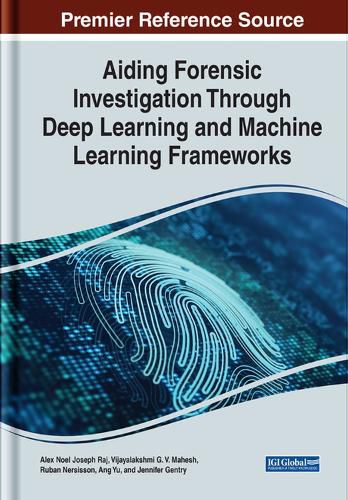Readings Newsletter
Become a Readings Member to make your shopping experience even easier.
Sign in or sign up for free!
You’re not far away from qualifying for FREE standard shipping within Australia
You’ve qualified for FREE standard shipping within Australia
The cart is loading…






This title is printed to order. This book may have been self-published. If so, we cannot guarantee the quality of the content. In the main most books will have gone through the editing process however some may not. We therefore suggest that you be aware of this before ordering this book. If in doubt check either the author or publisher’s details as we are unable to accept any returns unless they are faulty. Please contact us if you have any questions.
It is crucial that forensic science meets challenges such as identifying hidden patterns in data, validating results for accuracy, and understanding varying criminal activities in order to be authoritative so as to hold up justice and public safety. Artificial intelligence, with its potential subsets of machine learning and deep learning, has the potential to transform the domain of forensic science by handling diverse data, recognizing patterns, and analyzing, interpreting, and presenting results. Machine Learning and deep learning frameworks, with developed mathematical and computational tools, facilitate the investigators to provide reliable results. Further study on the potential uses of these technologies is required to better understand their benefits.
Aiding Forensic Investigation Through Deep Learning and Machine Learning Frameworks provides an outline of deep learning and machine learning frameworks and methods for use in forensic science to produce accurate and reliable results to aid investigation processes. The book also considers the challenges, developments, advancements, and emerging approaches of deep learning and machine learning. Covering key topics such as biometrics, augmented reality, and fraud investigation, this reference work is crucial for forensic scientists, law enforcement, computer scientists, researchers, scholars, academicians, practitioners, instructors, and students.
$9.00 standard shipping within Australia
FREE standard shipping within Australia for orders over $100.00
Express & International shipping calculated at checkout
This title is printed to order. This book may have been self-published. If so, we cannot guarantee the quality of the content. In the main most books will have gone through the editing process however some may not. We therefore suggest that you be aware of this before ordering this book. If in doubt check either the author or publisher’s details as we are unable to accept any returns unless they are faulty. Please contact us if you have any questions.
It is crucial that forensic science meets challenges such as identifying hidden patterns in data, validating results for accuracy, and understanding varying criminal activities in order to be authoritative so as to hold up justice and public safety. Artificial intelligence, with its potential subsets of machine learning and deep learning, has the potential to transform the domain of forensic science by handling diverse data, recognizing patterns, and analyzing, interpreting, and presenting results. Machine Learning and deep learning frameworks, with developed mathematical and computational tools, facilitate the investigators to provide reliable results. Further study on the potential uses of these technologies is required to better understand their benefits.
Aiding Forensic Investigation Through Deep Learning and Machine Learning Frameworks provides an outline of deep learning and machine learning frameworks and methods for use in forensic science to produce accurate and reliable results to aid investigation processes. The book also considers the challenges, developments, advancements, and emerging approaches of deep learning and machine learning. Covering key topics such as biometrics, augmented reality, and fraud investigation, this reference work is crucial for forensic scientists, law enforcement, computer scientists, researchers, scholars, academicians, practitioners, instructors, and students.